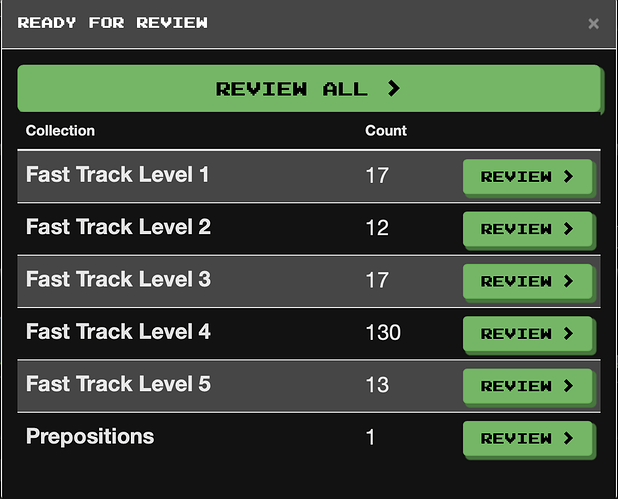As long as it’s optional, why not.
I, for one, would not like that change if I couldn’t opt out of it.
I’m one of these people. Let’s say I already internalized all the 100/500/1000/2000/3000/4000/5000 most common words and I’m struggling only with the words from the 10000 most common words collections and the pronouns collection. My approach would be to do one review session for the 10000 most common words collection and another one for the pronouns collection.
I would not want words from the 100 or 2000 most common words collection, which I already mastered, to be included in my reviews and waste my time.
If I’m behind and accumulated too many reviews to do in one day, I’d click this “Review” button for the collection in which I feel the weakest, in order to (1) spend all my time on where I’m weak, not on what I already mastered, and (2) to decrease that review pile without adding unseen/new sentences that would add to the review pile the next day, and thereby further increase the review pile.
After finishing reviewing the one collection, I’d click the same button for the other collection. Surely, the two sessions for the 10000 most common words and pronouns could be merged into a single session. But how would you prevent the 100/500/1000/2000/3000/4000/5000 most common words (that I explicitly don’t want to practice simply due to time constraints) from being merged too? That would make things unnecessarily complex. I personally think there are other areas in Clozemaster that could better use the limited developer attention. I, for one, don’t mind doing two separate sessions.
Let’s further say I can invest only 10 minutes a day into Clozemaster. Which is about two 50 words sessions in my case. With my approach, I can do two separate sessions, focusing on my two weakest areas. For example, numbers and prepositions, or pronouns and the 10000 most common words collections. That targeted approach would no longer be possible if your proposal would be implemented with no possibility to opt out. Especially since there already is a feature that lets you review all reviews in one session and almost lets you do what you want (and just does not include any new words). It’s this “Review” button:
As you can see, I accumulated more reviews than I’m willing to do in one day, so for the foreseeable future, I’m not going to ever click on the “Play” button, only on the “Review” button next to it.
Personally, I think that introducing all this additional complexity only to squeeze out the last few drops out of the lemon when you already have almost all the lemon juice is not worth it, at least for now, but you might see it differently. Or, instead of saying, “is not worth it”, let’s rather say, “has a much lower priority than other open feature requests”.
I should add that I’m playing only the most common words collections. Your request seems to refer to the fast fluency track, whose collections tend to be much smaller (being limited to 1000 sentences a collection).
Maybe your proposal could be implemented for the fast fluency track only. Since its collections tend to be much smaller than the most common words collections, it should happen much less for huge piles of reviews to accumulate, resulting in less strict time constraints than with the larger most common words collections.
In other words, it doesn’t take away that much if only 47 out of your 50 sentence session are from the selected collection (for example, 10000 most common words) when only 3 reviews from previous collections were due for review again (for example, 2 reviews from the 3000 most common words and 1 review from the 4000 most common words). Rather than the inverse (only getting to 3 reviews from the 10000 most common words even though you specifically selected the 10000 most common words, because your review pile got so big that 23 reviews from the 1000 most common words, 17 from the 2000 most common words and 7 from the 5000 most common words get mixed in) which becomes more likely, the more sentences the collections contain.


